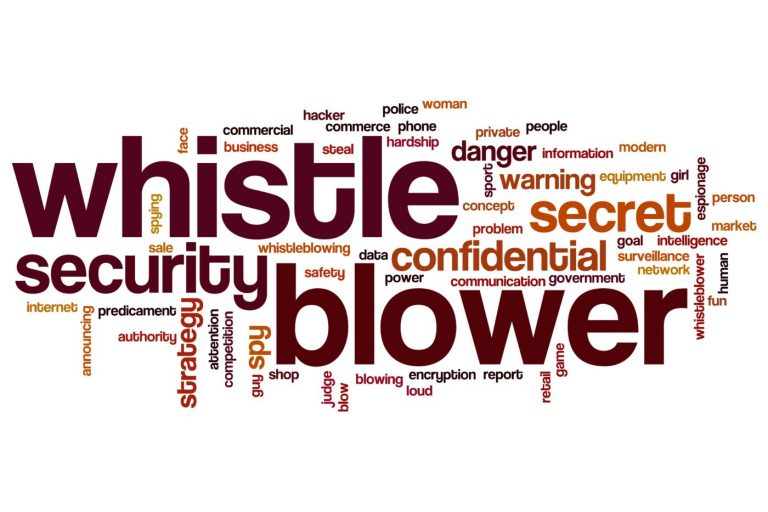
Whistleblower – The decision to become a whistle-blower is not to be taken lightly
Becoming a whistle-blower is one of the biggest decisions to make. It is a life-changing decision. It is also one that is wrought with danger and intimidation.
The decision should not be taken without consultation with close family members as this will put a lot of strain on relationships within the family group.
In doing research for these articles, I have endeavoured not to become closely involved and to write my own opinions on the matter. I have combed the internet in search of reasons and explanations.
There are now several groups and organisations that offer help to whistleblowers. Legislation in South Africa is very advanced when it addresses whistleblowing but in practice, it is another story altogether. This is where the groups and organisations are of great help.
Let us explore some of the reasons that people become whistleblowers.
There is no question that most whistleblowers decide to act because they feel their sense of justice and code of ethics compels them to do so. Whistleblowers understand that the illicit activity taking place isn’t just illegal—it can also be harmful. Illicit actions may harm the community, jeopardize the health of the employees, compromise environmental safety, or defraud the government and, ultimately, taxpayers. Whistleblowers are driven by a strong sense of integrity. They simply want to do the right thing.
In some cases, whistleblowers are motivated by a sense of self-preservation. There is one famous case in which a Vietnam veteran became a whistleblower when he realized his Medicare claim was denied due to egregious overbilling for services he hadn’t received. As a result, the veteran, who had muscular dystrophy, couldn’t get the care that he truly needed. He brought a qui tam lawsuit in an effort to stop the Medicare fraud, and so that he could receive the medical care he needed.

If you have taken the step to become a whistle-blower it would be advisable to take advice from lawyers and groups that specialise in this field but also take care as not to blabber all your information to the world.
Also read: Whistleblowing and the associated dangers!
The following advice was taken from Facebook that was written by an actual whistle-blower:
How to speak up.
1. Don’t.
2. But if you do, make sure you make backups of backups all the time.
3. Install a phone call recorder.
4. Make sure you have a proper audio recording quality on your phone. Test it. Make an easy and quick to access icon on your phone.
5. Ensure that your phone is locked with at least a pin or fingerprint.
6. Install a background video recorder on your phone. These apps have a quick launch button while your phone is locked. It also ensures that another person cannot grab your phone and delete the video as your phone is locked.
7. Record all meetings and discussions you are party to. Refer to the RICA act of South Africa.
8. Write down what happens to you as soon as possible and email it to yourself. It will help you to remember facts of events and dates and times. This will also give you a file with an electronic date and time stamp on which could be useful.
9. Make backups of your storage devices and give it to people you trust to keep safe. A lawyer will keep a storage device for you for a small fee. You can even give a storage device to your life insurance broker to keep for you.
10. Make backups of your files on the cloud. It’s free. Use multiple usernames.
11. Use internet cafe computers if you can, to back up your files to the cloud. Make sure to not write the username or password down anywhere. Make sure it is something you will never forget. This will give you the power to access your files from any internet connection in the world.
12. Save ALL emails, no matter how unimportant it seems at the time. Make backups regularly.
13. Study up on the law and acts of South Africa. Use Google to find any act of South Africa.
14. Study up on South African case law (already determined cases which may be like your case). Use Google or the SAFLII website. https://www.saflii.org/
15. Union reps are usually on the employer’s payroll. Don’t expect too much help when taking on your employer.
16. Be proactive. You could be ignored on purpose.
17. Be prepared to lose your job.
18. Lawyers are very expensive. Some law firms will help you on a Pro Bono basis. Ask them.
19. To take your case to labour court is insanely expensive. R80 grand and more as a deposit before your lawyer even take your case to court.
20. Get emotional support, see a psychologist or psychiatrist. It gets tough, really tough.
21. Know your case inside and out. Never doubt yourself. Keep a diary if you can, you’ll be surprised how that helps.
22. Ethics lines work for money, don’t expect much.
23. Read the Protected Disclosures Act. But don’t rely on its stipulations to be adhered to.
24. Make sure that your files end up in capable hands should anything happen to you. Make multiple arrangements.
25. It will take many years. It is a marathon, not a sprint.
26. No one wants to go to prison. So, expect threats and intimidation by the guilty to keep you quiet.
27. Ensure the safety of yourself and your family. Get advice and help where you can.
28. “There is no avoiding war, it can only be postponed to the advantage of others.” Meaning, act as soon as you can, don’t rely on internal procedures alone. If it concerns the outside world, then tell the outside world (meaning tell the authorities).
29. Finally once you start it’s like a water slide…. there is no getting off until the end.
There are several links below that one can visit for more information and support:
Information on the Protected Disclosures Act by the Institute for Security Studies click HERE
Corruption Watch
Tel: 0800 023 456 (call centre for whistleblowing)
E-mail: info@corruptionwatch.org.za
Website: http://www.corruptionwatch.org.za
The Open Democracy Advice Centre (Odac)
Tel: +27 (21) 461 7211
E-mail: contactus@thedti.gov.za
Website: http://www.opendemocracy.org.za/
Right 2 Know
Tel: +27 (21) 447 1000
E-mail: admin@r2k.org.za
Website: http://www.r2k.org.za/
The Institute for Security Studies
Tel: +27 (21) 461 7211
E-mail: lala@iss.co.za
Website: http://www.iss.co.za
The Public Service Commission
Tel: +27 (12) 352 1031
The office of the Public Protector
Toll free line: 0800 11 20 40
The office of the Auditor-General
Tel: +27 (12) 426 8000
National Anti-Corruption Forum
Hotline: 0800 701 701
Whistle Blowers
Tel: +27 (086) 000 5111
E-mail: admin@whistleblowing.co.za
Website: http://www.whistleblowing.co.za/